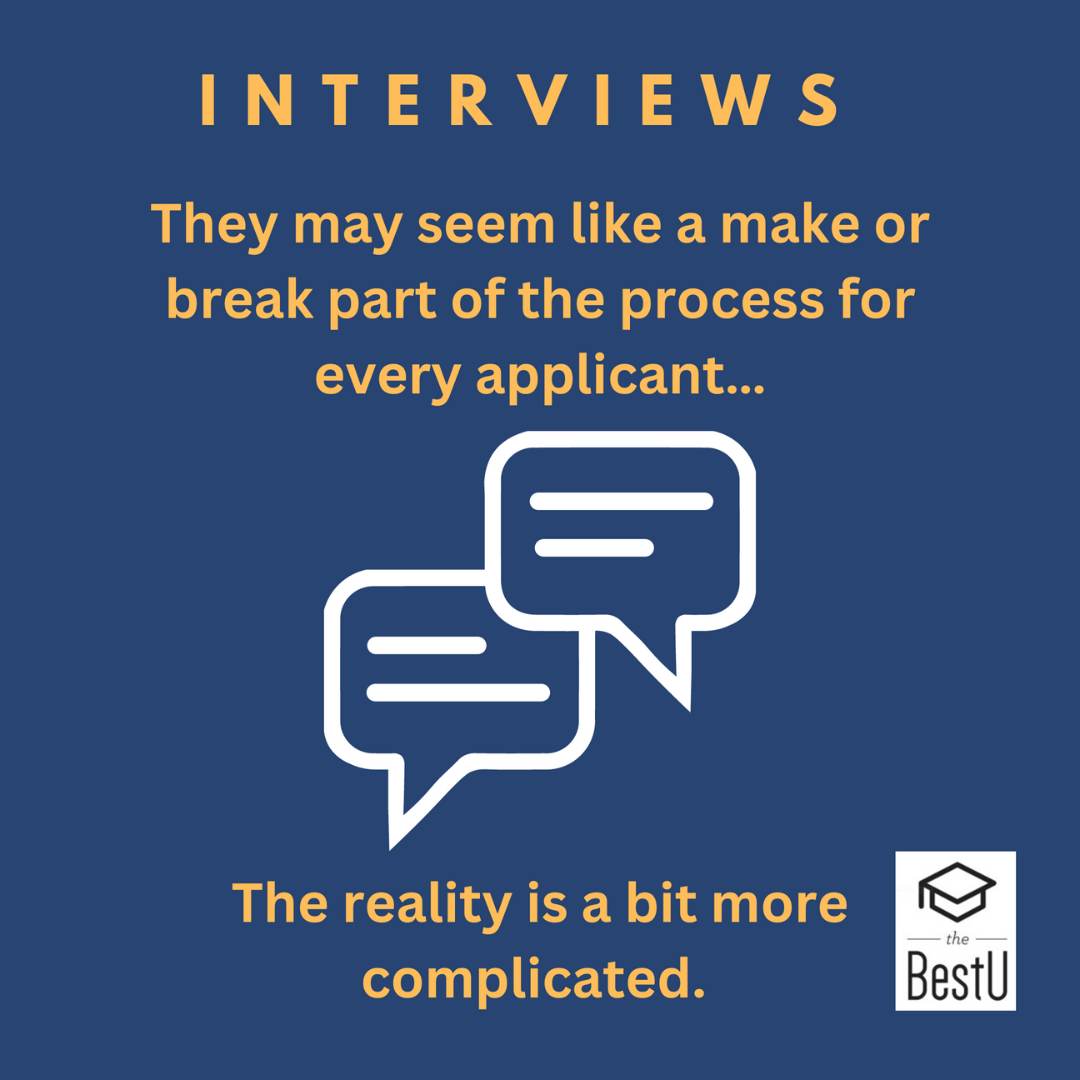
Are interviews important? Do they ‘count’ in the admissions process? How do I get one? Can juniors interview? If you are wondering what the deal is with college interviews, we appreciate that this is one area of college admissions that feels like a big question mark to many students and families.
Read on for what you need to know about the role of interviews in the admissions process and how to make the most of these opportunities–
How important are interviews in the admissions process?
The conversations that swirl around college admissions may make it seem like interviews are a make or break part of the application process for every student. The reality is a bit more complicated. While some colleges do consider admission interviews an important part of their process, they are definitively in the minority. A “State of College Admissions Report” from the National Association for College Admission Counseling (NACAC) recently surveyed colleges and universities on this very question and only 22% of colleges consider admission interviews to be of “considerable or moderate importance” to their decision process. 78% of colleges give the interview limited or no importance in the overall admissions decision.
Even among colleges that offer interviews, it is important to visit their website and read any detailed information they provide about interviews and their role in a student’s admissions process. You can further confirm the specific role of the interview in the admissions decision by searching online for and reviewing the most recent Common Data Set information for your college of interest.
Many colleges offer interviews that are considered “informational.” While an informational interview is a nice opportunity to connect with an alum, student, or (less frequently) an admissions representative, it does not factor into the application review or decision making process. Only when colleges indicate that the interview is “evaluative” will it be considered in the selection process. Because access to interviews can be limited and colleges cannot guarantee the opportunity to every applicant, many clearly indicate that a student’s application will be complete without the interview. At these institutions they are clear that it will not impact the application not to have had the opportunity, even in cases where an interview may sometimes be used in the evaluation process.
How do you get an interview?
As application numbers continue to soar, many colleges have revisited the role of the interview in their admissions process. In the summer of 2023, Columbia University announced that interviews would no longer be considered in the admissions process and will not be offered at all going forward. In 2022, Brown University discontinued the student interview process and instead encouraged students to complete an optional two-minute video introduction to personalize their application. The last time Brown offered interviews in the 2019-20 application cycle more than 8000 applicants who requested interviews did not receive one. Wake Forest University, one of the minority of colleges that considers the interview “important” in their admissions process, offers the option to interview or complete a video introduction, which both carry equal weight in the evaluation.
The best way to know your options and the steps you must take is to carefully read the information about interviews on the college’s admissions website. A majority of colleges now only offer interviews after a student has submitted the application. Some, such as Harvard and MIT, will automatically consider you for an interview in a ‘don’t call us, we’ll call you” approach, while others require students to indicate their interest through completing an interview request in their applicant portal after applying. Returning to Wake Forest, their policy only allows students to request an interview or submit a video within five days of submitting the application, and there are cut off dates by which requests must be made. This makes it advantageous to know this ahead of time and to submit the application earlier than the deadline.
All of this points to the importance of two key steps: review the admissions website information early and carefully and closely follow up after applying by checking and reading email from the college and frequently logging into your applicant portal for each institution that provides one.
What should you be prepared to talk about?
If the interview you are preparing for is an evaluative one, you want to be ready to discuss a few key elements of your story. Be prepared to share about your academic and intellectual interests, your experiences in high school, the ways you spend your time, lead, and engage in your community, and to reflect on your strengths. Perhaps most importantly, you want to be ready to discuss your specific, detailed interest in the college, why it aligns to your goals and values, how you will engage and contribute in the college community, and what academic experiences and offerings you find especially exciting. This does not require memorizing the entire website or any statistics, but it does require doing your research to be able to talk comfortably about how your interests, learning style, and passions will fit specifically into the picture of life on that campus.
Come prepared with a few questions you are ready to ask when the interviewer inevitably invites you to ask them questions. These should be related to your personal perspective, activities, and academic interests that you can’t find by simply searching online. You can also ask about your interviewer’s personal experience as a student, alum, or admissions representative. What do they love about the community, what experience made them know they were ‘home,’ what is their favorite official or unofficial tradition on campus? Remember, you and the interviewer have something in common: you both love this college. A great interview is really just a great conversation. If you’ve thought about these topics ahead of time, you are ready. Asking for a minute to think about your response is not an indication you are unprepared, but rather that you are reflective, so take a breath. Your goal is not to perform well but to relax as much as you can and form a genuine connection.
TBU Advisors are experienced in supporting students to navigate their college choices and personal best fit. Our passion is helping you make a plan that takes the overwhelm out of the process, empowers you to become your own best you, and puts your best self forward in your admissions process & applications.
If you’d like to explore working with a TBU Advisor, get in touch here and we will look forward to connecting with you.
Looking for more insights like these? Join us on our Membership Platform for exclusive content, live webinars, and the resources and tools to unstick your college process.
